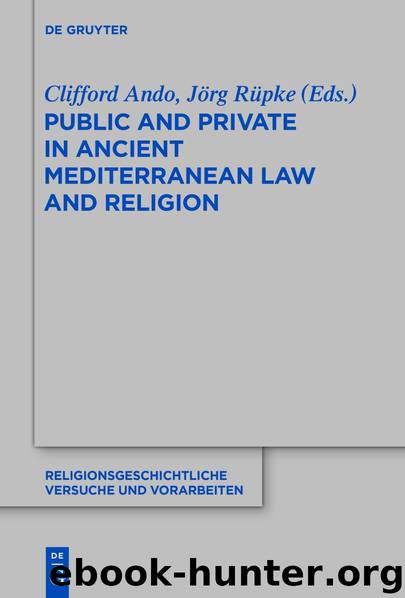Public and Private in Ancient Mediterranean Law and Religion by Ando Clifford Rüpke Jörg

Author:Ando, Clifford,Rüpke, Jörg
Language: eng
Format: epub
Publisher: De Gruyter
Published: 2015-02-23T16:00:00+00:00
3. Marcus’s Love Potions: Marking Territory inIrenaeus
Ιrenaeus (c. 130 – c. 200 CE), bishop of Lugdunum in Gaul, continues and significantly develops the territorialism we have discovered in the Pastoral Epistles.531 Indeed he bases the title of his chief work, On the Detection and Refutation of Knowledge Falsely So Called (here after Heresies) on 1 Tim. 6.20, where “Paul” exhorts “Timothy” to avoid “the godless chatter and contradictions of what is falsely called knowledge.” Although Irenaeus rarely quotes the Pastoral Epistles, James W. Aageson has shown that he champions and develops an institutionalized vision of Pauline theology enshrined in them.532 The Pastorals represent Paul’s teaching as a “deposit [παραθήκη]” Timothy is to guard and preserve (1 Tim. 6.20–21; 2 Tim. 1.14); Irenaeus (Heresies 3.4.1) likens the apostles’ teachings as deposits in a bank account – the church. In the Pastorals, Timothy and Titus are to appoint presbyter-bishops and deacons who will rightly govern churches. Irenaeus develops these ideas by linking them: those bishops who can trace their succession from bishops appointed by the apostles, who teach what conforms with their deposit, and thus preserve and pass it on, alone are the guardians and representatives of true Christian teaching (Heresies 3.2.2; 3.3.1,3; 4.26.2). The Pastorals accuse opponents of “other teaching [ἑτεροδιδασκάλειν].” Irenaeus uses the term αἱρετικóς (hereticus) expressly to describe false teachers and impious belief (Heresies 2. praef.1; 3.3.4; 3.6.4, 15.2, 23.8; 4.26.2; 5.32.1).
Irenaeus like the Pastorals associates right doctrine with public instruction and heresy with a form of secret teaching he describes as circulating privately away from open view. He emphasizes the public proclamation of the apostles (3.11.7–12.13), who faithfully transmitted the teachings they received from Jesus, first orally and then later in written form (Heresies 3.1.1). This he contrasts with that of heretics who confess one thing in church in public but think another in secret, or teach false opinions in private that contradict the truth. The public private distinction is important for Irenaeus’ own territorialism, as we will see. In Heresies 3.4.3 he describes how Valentinus when he came to Rome confessed one thing in public and another in private. Later in 3.16.8 he warns against those who “appear to be like us, by what they say in public, repeating the same words as we do [habent extinsecus loquelam similis nobis apparent]; but inwardly [intrinsecus] they are wolves.” This he warns is a strategy “to entrap the more simple, and entice them, imitating our phraseology.” They wonder, Irenaeus asks, “how it is, that when they hold doctrines similar to ours, we, without cause keep ourselves aloof from their company; and that when they say things, and hold the same doctrine, we call them heretics?” (3.15.2).
Irenaeus puts forward a concrete example in an extended description (1.13.1–15.6) of the behaviors and beliefs of the Valentinian teacher, Marcus, active in his own community in Gaul.533 From a social geographical perspective it is important to note how Irenaeus represents Marcus’ activities both in households away from public view and how he associates them with women.
Download
This site does not store any files on its server. We only index and link to content provided by other sites. Please contact the content providers to delete copyright contents if any and email us, we'll remove relevant links or contents immediately.
The Daily Stoic by Holiday Ryan & Hanselman Stephen(3301)
The Fate of Rome: Climate, Disease, and the End of an Empire (The Princeton History of the Ancient World) by Kyle Harper(3055)
People of the Earth: An Introduction to World Prehistory by Dr. Brian Fagan & Nadia Durrani(2728)
Ancient Worlds by Michael Scott(2682)
Babylon's Ark by Lawrence Anthony(2672)
The Daily Stoic by Ryan Holiday & Stephen Hanselman(2569)
Foreign Devils on the Silk Road: The Search for the Lost Treasures of Central Asia by Peter Hopkirk(2456)
India's Ancient Past by R.S. Sharma(2450)
MOSES THE EGYPTIAN by Jan Assmann(2412)
The Complete Dead Sea Scrolls in English (7th Edition) (Penguin Classics) by Geza Vermes(2277)
The Earth Chronicles Handbook by Zecharia Sitchin(2226)
Lost Technologies of Ancient Egypt by Christopher Dunn(2223)
24 Hours in Ancient Rome by Philip Matyszak(2078)
Alexander the Great by Philip Freeman(2064)
Aztec by Gary Jennings(2021)
The Nine Waves of Creation by Carl Johan Calleman(1915)
Curse Tablets and Binding Spells from the Ancient World by Gager John G.;(1860)
Before Atlantis by Frank Joseph(1849)
Earthmare: The Lost Book of Wars by Cergat(1823)
